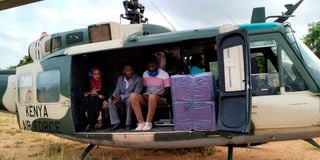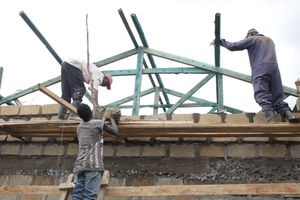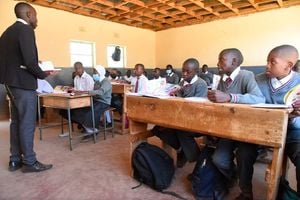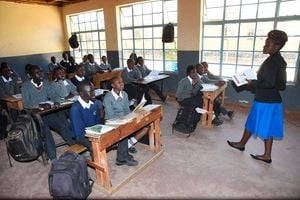
Teachers working in terror-prone Boni Forest in Lamu airlifted by military chopper to their respective schools as the State reopens schools in the area.
For decades, the phased-out 8-4-4 system of education in Kenya had been like a curse for learners in Lamu’s Boni Forest region.
Despite its 32 years of existence, 8-4-4, which was introduced in Kenya in January 1985 by President Daniel arap Moi, did not establish any secondary school within Boni.
Besides this, the implementation of primary school education in Boni Forest has also been a nightmare.
The challenges are attributed to recurrent attacks by Al-Shabaab militants between 2014 and 2021.
In 2014, for instance, five primary schools in Boni including Milimani, Basuba, Mangai, Mararani and Kiangwe had to be shut for almost eight years in a row.
This was due to heightened Al-Shabaab attacks, a situation that left over 400 Boni pupils in limbo.
During that dark period, teachers fled for fear of their security.
In 2021, however, the government reopened the five schools but this time round, only Early Childhood Education Centres (ECDE) up to Standard Four were allowed to operate.
Upper primary pupils were directed to be ferried to Mokowe Arid Zone Primary in Lamu West and Kiunga Primary in Lamu East.
Parents have been pushing for a common education centre to be established in the area to allow their children to fully acquire education within their vicinity.
In Boni Forest, students completing Standard Eight had to be admitted to schools in other parts of Lamu or outside the county, far away from Boni Forest.
Ray of hope
The introduction of the Competency-Based Curriculum (CBC) in 2017 to replace the 8-4-4 system of education, however, has shone a ray of hope to the community.
CBC was first unveiled in December 2017 when the Ministry of Education sought to equip learners with skills relevant to the current global job market.
Within seven years of its implementation, Boni Forest region is gearing up for children to progress to Junior Secondary School (JSS) without having to travel far from home.
Lamu East Sub-County Director of Education, Ali Lali told Nation that the Education Ministry embarked on the construction of what he referred to as a common JSS learning centre at Kiangwe since August this year.
Mr Lali noted that two classroom blocks with a capacity to hold at least 100 learners in total will accommodate Grade 9 students from all the five villages of Boni Forest. The school will also accommodate the other JSS pupils.
JSS learners
The construction of Grade 9 classrooms is planned to be completed before the end of this month.
“We want to start enrolment of JSS learners at Kiangwe common JSS centre by January 2025. Parents shouldn’t be worried. JSS learners from Kiangwe and the other four villages of Milimani, Basuba, Mangai and Mararani, all in Boni Forest, will be accommodated there from next year,” said Mr Lali.
Lamu County Education Director Zachary Mutuiri also reiterated that arrangements have been made to ensure the Boni JSS learners and those in other parts of Lamu get to learn in conducive environments.
Mr Mutuiri noted that apart from the Kiangwe JSS common centre, they also have other 39 Grade 9 classrooms whose construction is being finalised across Lamu County.
“We expect them to be handed over to us before the end of this month. We also have 31 other Grade 9 classrooms whose construction was finalised and handed over to us a long time ago. Grade 9 textbooks have also started to stream in. There’s no cause for worry,” said Mr Mutuiri.
He called on parents, especially those in Boni Forest to monitor the behaviour of their children and be strict.
Parents termed the measures as a reprieve to learners.
Asha Guruba, a mother of four and a resident of Mangai, said having a JSS school within Boni Forest will help reduce cases of dropouts, unwanted pregnancies and early marriages among students in their villages.
Hussein Nuri, a resident of Kiangwe, said many parents in Boni are poor and have been unable to fund their children’s travel, either to Kiunga or the Mokowe Arid Zone schools and other places like Lamu Island where Junior Secondary School (JSS) learning is readily available.
“Parents here are poor. They can’t fund their children to travel those long distances outside Boni Forest as they seek secondary school learning,’’ he said.










